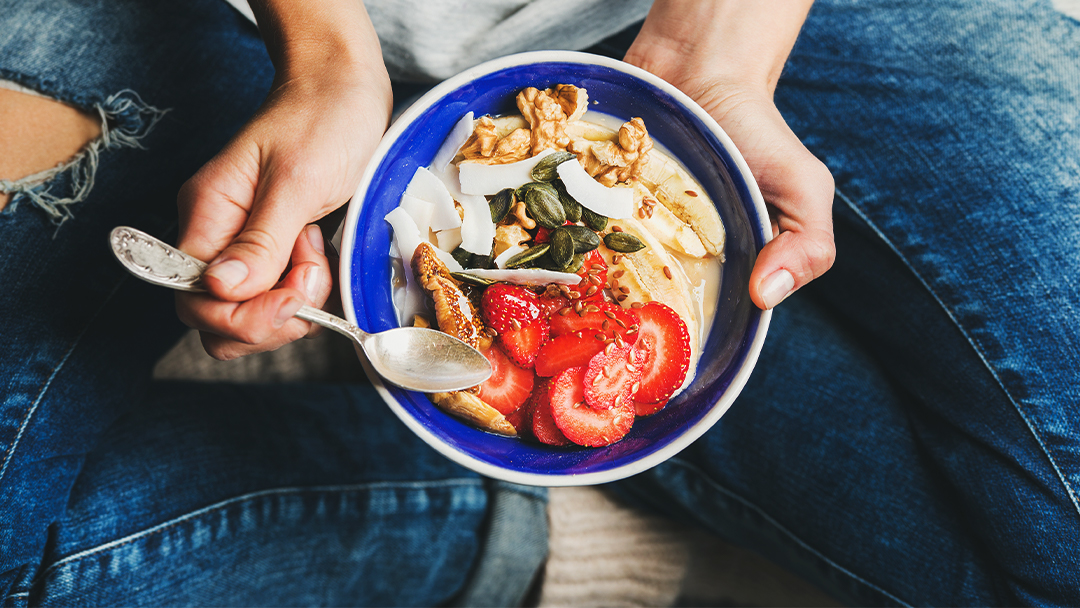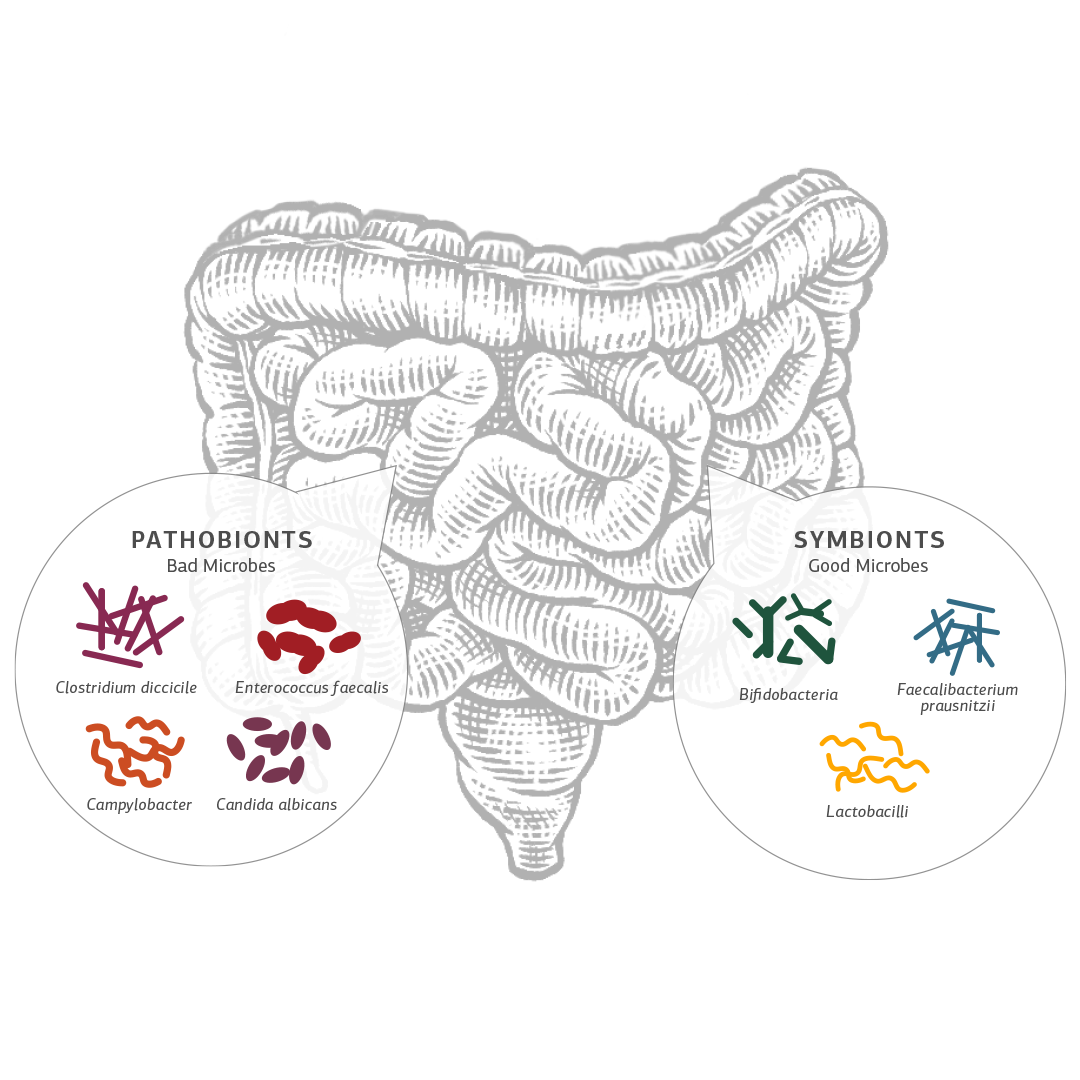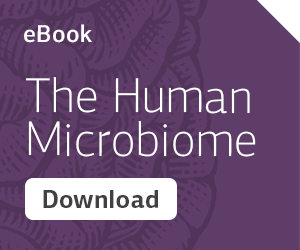Top 7 Reasons Why Your Gut’s Microbiome Health Matters

Your gut’s microbiome health matters because it influences how your entire body functions. Optimizing gut health and your microbiome with healthy lifestyle choices – such as positive nutrition, exercise, and environment status -- as much as you can will help your digestive system operate as nature intended: in harmony with the healthy microbes within the gut’s microbiome.
The microbiome is important for so many reasons. Here are the top seven reasons your gut’s microbiome health matters:
1. A healthy microbiome supports regular, healthy inflammation response.
All the microbiota living in your gut make up part of a protective barrier from the external world. A healthy microbiome helps protect the body’s inflammatory processes by supporting barrier integrity and influencing inflammation-generating events.[1]
 2. “Good” microbiota protect the gut from “bad” microbiota.
2. “Good” microbiota protect the gut from “bad” microbiota.
A healthy lifestyle can support growth of “good” microbes in the gut that compete with “bad” microbes for nutrients and space.[2] This is a perfect example of the mutually beneficial relationship between us and our gut microbes. We give them a place to live, and they pay rent by keeping the bad guys at bay.
3. Phytonutrients from plants are transformed for further use in the microbiome.
A healthy microbiome provides an assembly line of sorts. It transforms phytonutrients from plants consumed in the diet into a form that’s more biologically available for absorption and use in the body.[3] For example, many phytonutrients act as antioxidants in the body.
4. Gut bacteria produce fuel for gut cells.
Bacterial fermentation processes in the gut microbiome produce short-chain fatty acids (SCFA), like butyrate, that gut cells of the digestive tract can use as a nutrition source. Fortifying gut cells has a positive impact on intestinal wall integrity, immune function, and nutrient absorption.[4]
5. The microbiome regulates the exercise-induced stress response through the gut-brain axis.
Research shows that physical activity supports digestive health (as well as being supportive of general whole-body health) and vice versa. In a “you scratch my back, I scratch yours” sort-of relationship, gut microbes regulate neurotransmitters in response to stress, and moderate exercise supports the movement of food through the digestive system.[5]
6. Immune health and microbiome health go hand-in-hand.
Supporting healthy immune function through nutrition and other lifestyle choices includes promoting a healthy microbiome. Microbes provide direct and indirect immune system benefits. Indirectly they help train the developing immune system to respond properly to threats, and directly the microbes compete with and attack other microbes that may be problematic.[6]
7. Microbes can generate and help us absorb essential nutrients.
Certain microbes are able to produce essential vitamins our bodies are unable to make. These vitamins can help us achieve nutritional status and support additional microbes that need these vitamins for survival as well.[7] Some microbes can also help us absorb some essential minerals from the diet more effectively.[8]
The health status of your microbiome is intricately intertwined with the health of your whole body, so it’s difficult to make a list of just # reasons why it is important. It’s easy to support a healthy microbiome with nutrition, physical activity, and other lifestyle habits.
How Nutrition Supports Gut Microbiome Health
 The food we consume has the ability to improve the microbiome by providing nourishment to the microbes in our gut. Making healthy diet choices to improve the microbiome can tilt the odds in favor of commensal (“good”) bacteria over disruptive (“bad”) bacteria, by providing commensal bacteria with the specific energy they need whenever possible.
The food we consume has the ability to improve the microbiome by providing nourishment to the microbes in our gut. Making healthy diet choices to improve the microbiome can tilt the odds in favor of commensal (“good”) bacteria over disruptive (“bad”) bacteria, by providing commensal bacteria with the specific energy they need whenever possible.
It is also important for dietary choices to be diverse, because diversity in the gut microbiome reflects diversity in the diet. In addition to dietary fiber, fermented foods — such as yogurt and kefir — improve the microbiome by adding bacterial species to the populations of microbiota in the gut.[9]
Learn more in our eBook, The Human Microbiome. It gives a brief introduction to the human microbiome – how it works, why it’s valuable to your health, and what you can do to maintain it.
[1] Hiippala, K., Jouhten, H., Ronkainen, A., Hartikainen, A., Kainulainen, V., Jalanka, J., & Satokari, R. (2018). The Potential of Gut Commensals in Reinforcing Intestinal Barrier Function and Alleviating Inflammation. Nutrients, 10(8), 988. https://doi.org/10.3390/nu10080988
[2] Sassone-Corsi, M., & Raffatellu, M. (2015). No vacancy: how beneficial microbes cooperate with immunity to provide colonization resistance to pathogens. Journal of immunology (Baltimore, Md. : 1950), 194(9), 4081–4087. https://doi.org/10.4049/jimmunol.1403169
[3] Wilson, A. S., Koller, K. R., Ramaboli, M. C., Nesengani, L. T., Ocvirk, S., Chen, C., Flanagan, C. A., Sapp, F. R., Merritt, Z. T., Bhatti, F., Thomas, T. K., & O'Keefe, S. (2020). Diet and the Human Gut Microbiome: An International Review. Digestive diseases and sciences, 65(3), 723–740. https://doi.org/10.1007/s10620-020-06112-w
[4] Morrison, D. J., & Preston, T. (2016). Formation of short chain fatty acids by the gut microbiota and their impact on human metabolism. Gut microbes, 7(3), 189–200. https://doi.org/10.1080/19490976.2015.1134082
[5] Exercise and Gut Health - Stress & Digestion. (2020, October 19). Retrieved January 07, 2021, from https://wholisticmatters.com/physical-activity-stress-and-gut-health/
[6] La Fata, G., Weber, P., & Mohajeri, M. H. (2018). Probiotics and the Gut Immune System: Indirect Regulation. Probiotics and antimicrobial proteins, 10(1), 11–21. https://doi.org/10.1007/s12602-017-9322-6
[7] Yoshii, K., Hosomi, K., Sawane, K., & Kunisawa, J. (2019). Metabolism of Dietary and Microbial Vitamin B Family in the Regulation of Host Immunity. Frontiers in nutrition, 6, 48. https://doi.org/10.3389/fnut.2019.00048
[8] Skrypnik, K., & Suliburska, J. (2018). Association between the gut microbiota and mineral metabolism. Journal of the science of food and agriculture, 98(7), 2449–2460. https://doi.org/10.1002/jsfa.8724
[9] https://academic.oup.com/nutritionreviews/article/76/Supplement_1/4/5185609

About the Author
Sara LeBrun-Blashka, MS is the director of education at Standard Process. Sara is a nutritionist with Master’s in Nutrition Education at American University and a bachelor of science in dietetics and food science. Sara has strong industry experience working for multiple nutrition organizations over the last 20 years. Sara has also provided medical and nutrition marketing consulting services and medical food development to a wide range of health focus corporations. She has also provided radio interviews on multiple health programs and writes nutritional articles. Sara is a member of the Academy of Nutrition & Dietetics and American Society of Parenteral and Enteral Nutrition. She keeps busy with her family, dog, exercising and traveling. Sara has a passion for community-supported agriculture (CSA) and is active on multiple charitable boards.
More Posts by Sara Le Brun-Blashka, MS 2. “Good” microbiota protect the gut from “bad” microbiota.
2. “Good” microbiota protect the gut from “bad” microbiota. 

